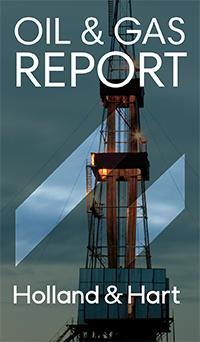UTAH COURT OF APPEALS APPLIES THE OPEN MINES DOCTRINE, REJECTS PETITION TO CONSTRUE WILL IN FAVOR OF LIFE TENANTS
In re Estate of Womack, 2016 UT App 83, 2016 WL 1729528, involved a decedent whose formally probated Will devised a 160-acre parcel to his three children, in equal shares. See id. ¶ 2. In his Will, the decedent specified that “the oil, gas and mineral rights under the said property . . . are devised to each of my children, share and share alike, for life,” remainder to the decedent’s grandchildren. Id. In 1990, the district court entered an estate closing order that named the decedent’s three children as the owners of the 160-acre parcel outright. Id. ¶ 3. In 1992, the district court amended the estate closing order “to conform to the Will” and provide for the grandchildren’s remainder in the minerals, which had been incorrectly omitted in the prior order. Id. ¶ 4. In 2008, an oil and gas company leased the minerals underlying the 160-acre parcel, but a question arose as to who was entitled to the proceeds of production. Id. ¶ 5.
In an effort to clarify who was entitled to the proceeds of production, one of the life tenants petitioned the district court to reopen the decedent’s estate and construe the Will in favor of the life tenants. According to the life tenant, the prior order’s lack of specificity resulted in an ambiguity that should be resolved in favor of the life tenants, based on an affidavit from the drafting attorney regarding the decedent’s intent. Id. ¶¶ 5 and 6. Two of the remaindermen challenged the petition, asserting that the requested relief would require the court to re-construe a provision of the Will that had already been construed, and that the court would be required to vacate or modify its prior order. This, the remaindermen contended, was barred by a six-month statute of limitations. Id. ¶ 14 (citing Utah Code Ann. § 75-3-412). The district court agreed with the remaindermen and denied the life tenant’s petition to construe the Will.
The life tenant appealed, claiming that the district court had misinterpreted the nature of the petition, and that the petition only sought clarification of the prior estate closing order, which was not subject to the six-month limitations period. The Court of Appeals affirmed the district court’s decision. The Court cited the open mines doctrine and concluded that the remaindermen were entitled to the proceeds of production because the Will did not specify otherwise. The Court found that the prior estate closing order had already construed the Will as creating life estates in mineral rights, and “[l]ife estates in mineral rights, by default, do not encompass a right to any proceeds from new mineral extraction.” Id. ¶ 17 (citing Hynson v. Jeffries, 697 So.2d 792, 797 (Miss. Ct. App. 1997). In the Court’s view, the Will was not ambiguous, and clarification was not necessary. Id. The Court found that the prior estate closing order “implicitly granted extraction proceeds to the [remaindermen] (albeit by default).” Id. ¶ 19. Because the petition sought to prove the decedent’s intent for the life tenants to receive income from the minerals, “rather than letting such proceeds default to the holders of the remainder” under common law, the Court found that the six-month time limit for vacations and modifications of prior orders applied, and the petition was time-barred. Id.
UTAH LEGISLATURE CONFIRMS THAT FEDERAL, STATE, AND TRIBAL INTERESTS MUST BE EXCLUDED WHEN CALCULATING SEVERANCE TAX ON OIL AND GAS
In the May 2015 edition of the Rocky Mountain Mineral Law Foundation Mineral Law Newsletter, we reported on the Utah Supreme Court’s decision in Anadarko Petroleum Corporation v. Utah State Tax Comm’n, 2015 UT 25, 345 P.3d 648 (Utah 2015). In Anadarko, the Court held that an oil and gas operator may exclude federal, state, and tribal interests when calculating its severance tax rate.
The Utah legislature recently codified the rule established by Anadarko. See S.B. 17, ch. 324, 2016 Utah Laws (amending Utah Code Ann. §§ 59-5-102 and 59-5-103.1). S.B. 17 confirms that the severance tax on oil and gas does not apply to federal, state, or tribal interests in oil and gas. As such, for purposes of determining the amount of severance tax, these exempt interests should be excluded when calculating the value of oil and gas and the tax rate. S.B. 17 applies to a taxable year beginning on or after January 1, 2015, as well as to severance taxes “for any taxable year, including a taxable year beginning before January 1, 2015, that is the subject of an appeal that was filed or pending on or after January 1, 2016.” Id.
(Re-printed from Andrew J. LeMieux, Utah Oil & Gas, Rocky Mountain Mineral Law Foundation Mineral Law Newsletter, May 2016)
